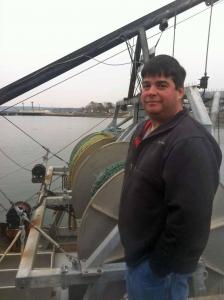James Keding

Sector Management in New England
This project documents fishery management related changes in individuals, households, and communities in New England.
Samantha Sperry
Jim Keding is a 42-year-old fisherman; he currently captains a commercial fishing vessel out of Plymouth, Massachusetts. This vessel, the Mystic, fishes inshore for groundfish and is in sector 10. Jim serves as the sector's Vice President. He began fishing at age 14, in 1987; he chose fishing simply because he lived near the Plymouth fishing docks, and his cousin was the only one who fished in his family. Prior to captaining the Mystic, he owned and operated his own vessels. Due to a mistake by NMFS (which is under investigation by Senator Kerry's office) in his allocation on a newly purchased vessel and subsequent low sector allocation, Mr. Keding had to sell both vessels, leasing his low quota and work as a captain on the Mystic. Mr. Keding has a negative view of sectors and would go back to the prior management by Days at Seas (DAS), given the opportunity. Since management by sectors began two years ago, Mr. Keding has experienced negative impacts on health and personal relationships. He has had to sell his boats and home, no longer has the independence he originally associated with fishing, and believes that his overall quality of life has decreased.
Please Note: The oral histories in this collection are protected by copyright and have been created for educational, research and personal use as described by the Fair Use Doctrine in the U.S. Copyright law. Please reach out Voices@noaa.gov to let us know how these interviews are being used in your research, project, exhibit, etc. The Voices staff can help provide other useful resources related to your inquiry.
The NOAA mission is to understand and predict changes in climate, weather, oceans, and coasts, to share that knowledge and information with others, and to conserve and manage coastal and marine ecosystems and resources. The Voices Oral History Archives offers public access to a wide range of accounts, including historical materials that are products of their particular times, and may contain offensive language or negative stereotypes.
Voices Oral History Archives does not verify the accuracy of materials submitted to us. The opinions expressed in the interviews are those of the interviewee only. The interviews here have been made available to the public only after the interviewer has confirmed that they have obtained consent.
